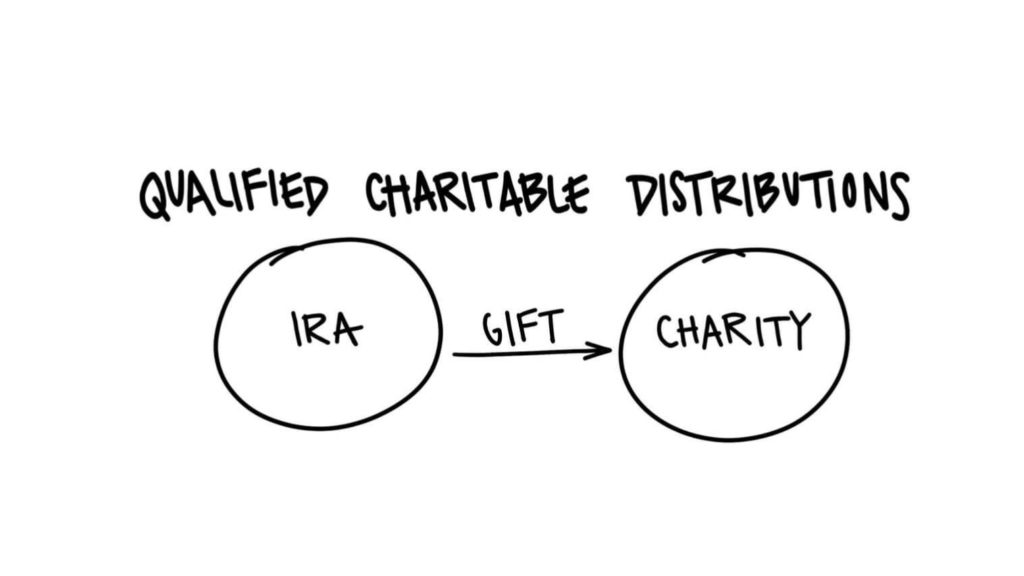Charitable Giving:
What You Should Know About QCD's
Presented by Eric K Peterson, CFP® Peterson Wealth Advisors
A Qualified Charitable Distribution (QCD) is a payment made directly from an IRA to a charitable organization. Specific requirements and circumstances must be met before an IRA owner can make a QCD. To help you understand the ins and outs of this charitable distribution, we’ve summarized the rules and best practices below.
What Are They and How Do They Work?
Generally, regular IRA distributions are considered taxable income for the IRA owner. Qualifying amounts that you donate as a QCD, on the other hand, are excluded from your taxable income. As such, you can use QCDs to lower your taxable income and, perhaps, minimize taxes in retirement. To make a QCD, the IRA owner must be age 70½ (the distribution must be made on or after the date he or she reaches 70½). In addition, there has been a change with the Secure Act 2.0 that just became law on December 29th, 2022, relating to the age RMDs begin. As of Jan 1st, 2023, the age to begin RMDs is now 73 instead of age 72. That means people turning age 72 this year do not have to begin an RMD but can still make a QCD to the charity of their choice. However, there are still benefits, as mentioned above and below. And remember, anyone over age 70-1/2 can qualify to make QCDs, and if they have already begun the RMD process, the QCD applies to your RMD amount, without taxation. As always, discuss these issues with your tax preparer.
Although there is no limit on the number of QCDs that can be made each year, the maximum allowable amount per year that can be distributed as a QCD is $100,000. Any donation amount above $100,000 will not be considered a QCD and will not qualify for the QCD tax benefit. For married taxpayers filing a joint tax return, $100,000 can be donated from each spouse’s IRA.
The receiving charity must be an organization eligible to receive tax-deductible contributions. Charities that do not qualify include private foundations and donor-advised funds. Be sure to check with your tax preparer or with the organization to confirm eligibility before making the distribution.

Be Aware of These Limitations
QCDs can only be made from traditional IRAs and traditional inherited IRAs. If making a QCD from an inherited IRA, you would still need to be age 70½ to qualify. QCDs cannot be made from active retirement accounts that you may have with your employer (e.g., SEP IRAs, SIMPLE IRAs, or qualified retirement plans, such as 401(k)s and 403(b)s). One exception to this rule is for inactive SEP and SIMPLE IRAs. QCDs are available from a SEP or SIMPLE IRA plan if the plan has been terminated with the employer or you’re no longer employed with the company sponsoring the plan.
Secondly, although a QCD is not taxed, it cannot be claimed as a charitable deduction. A tax advisor can help you determine whether a QCD or a charitable deduction provides the most benefit based on your situation.
Lastly, QCDs are calendar-year transactions. In order to receive a benefit, the distribution must be processed by the end of the calendar year that applies to that particular tax year. There is no option for a QCD to be distributed and applied to a prior tax year.
Special Processing and Reporting Requirements
To qualify as a QCD, the payment must be made directly from your IRA to the charity. So, when issuing a check from the IRA, the check must be made payable to the charity. The funds cannot be distributed to you directly and then later donated as a personal check. Typically, the check is mailed directly to the charity. In some situations, it can be mailed to you, and then you can then send it to the charity (again, the check must be payable to the charity).
Some custodians allow check-writing features on IRA accounts. You might think this is a convenient way to make a QCD, where you just write a check from your IRA to your desired charity. While this will satisfy the QCD requirements, it’s not recommended—for two reasons:
- Sometimes taxes are withheld automatically on checks written against IRAs and withholding taxes from QCDs is not advisable.
- IRA custodians report the distribution only after the receiving charity cashes the check. If the charity fails to cash the check in a timely manner, the distribution may not be reported as you intended.
All distributions taken from the IRA will be reported on Form 1099-R issued to you and to the IRS. There is no special coding on this form that designates a distribution as a QCD. It’s recommended that you notify your tax preparer of your intent to make a QCD so the tax preparer can report the distributions accordingly. In general, a QCD is reported on Form 1040 as follows:
- Enter the full amount as a charitable distribution on the line for IRA distributions.
- On the line for the taxable amount, enter zero if the full amount was a QCD. Then, enter “QCD” next to this line.
The charitable organization may provide you with a receipt for the payment, which can be included with your tax filing as proof of the donation.
QCDs from Roth IRAs and IRAs with Non-deductible Contributions
Under certain circumstances, a QCD may be made from a Roth IRA. Roth IRAs, however, are not usually subject to RMDs and distributions are generally tax free. So, you should consult with a tax advisor to determine if making a QCD from a Roth is appropriate for your circumstances.
In the event you have IRAs with both deductible and non-deductible contributions, distributions made under the QCD provisions will be made from the deductible (pretax) portion of the IRA before the nondeductible (after-tax) portion.
This material has been provided for general informational purposes only and does not constitute either tax or legal advice. Although we go to great lengths to make sure our information is accurate and useful, we recommend you consult a tax preparer, professional tax advisor, or lawyer.
Peterson Wealth Advisors is located at 1334 E Kingsley St, Suite B, Springfield, MO 65804 and can be reached at (417) 887-4950.
Securities and Advisory Services offered through Commonwealth Financial Network®. Member FINRA/SIPC, a Registered Investment Adviser. Fixed insurance products and services offered through CES Insurance Agency.
© 2022 Commonwealth Financial Network®
